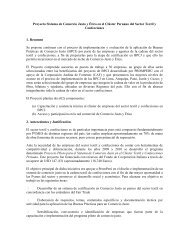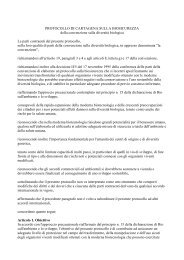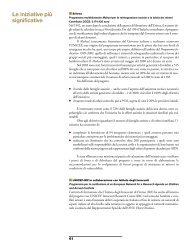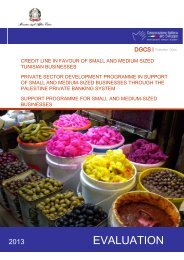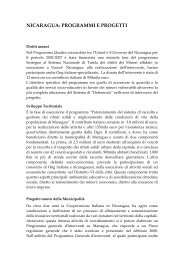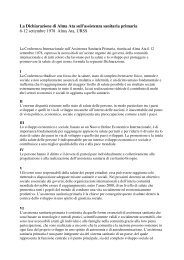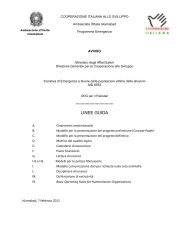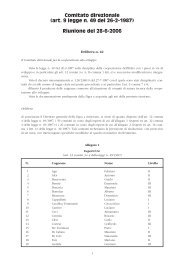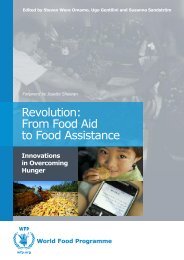sanctions, sometimes, also in presence of serious violence against the person andnotwithstanding the contestation of “important” criminal juridical cases, one hasthe impression that all the investigations undertaken are directed towards anunsatisfactory result.The causes of this situation are various. In the first place often in the trialsrelated to the exploitation of prostitution the accused arrive at making a fullconfession, aware of the benefits that this may bring at penal and trial level: aboveall, if with a clean record, the madams opt for a procedure of applying thepunishment at the request of the parties (the so-called “plea bargain”) or, afterhaving opted for the abbreviated trial, they admit the accusations bringing aboutthe rapid end to the trial, avoiding further investigations.The confession is so that in many cases they are permitted the generalisedextenuating circumstances (Art 62 bis) which, together with the lowering of thepunishment for the rite chosen and the reduction given to the fact that normally itdeals with crimes united with the tie of continuation, determines a considerablelowering of the sanction.In a judicial case of second grade, the possibility of the so-called “plea bargainin appeal” (Art. 599 Penal Code Procedures) - if not opted for in the first degree -permits a further reduction in the sanction. The generalised impression is that in thesecond grade of judgement t<strong>here</strong> is a general favour for this system which <strong>allo</strong>wsthe general prosecutor to avoid debates, t<strong>here</strong>fore saving time, and the panel ofjudges to “not deliver a sentence”; the risk is to not pay attention to concrete cases,but to always grant such reduction.To this picture one must now add the recent widened plea bargain introducedby the Law No. 134 of 12 June 2003. This law raised the ceiling within which it ispossible to ask for the application of the sentence at the request of the parties (itpasses from 2 to 5 years net of circumstances and the reduction of a third, forwhich the basic sentence can also be of 10 years) 96 , so that crimes like homicide,sexual violence, aggravated hold-ups, corruption or extortion can be included.The accused may be judged according to this rite only when the publicprosecutor gives consent: as it was for the other forms of plea bargain it will be t<strong>here</strong>sponsibility of the public prosecutor to make the right choice in a concrete case,seeking to avoid generalised applications that can invalidate the objectives of thecriminal policy for the fight against the traffic of persons for sexual exploitation.The other sore point of the new regulations is the total lack of consideration ofthe position of the victim and the injured party: the sentence, in fact, is not valid inthe civil courts so, to obtain satisfaction, one must start an ad hoc civil proceeding.Moreover, the penitentiary benefits and alternative modalities of execution of thesentence 97 , are today inserted on sanctions which are already greatly reduced duringthe proceeding. This was part of a system in which this multiple mechanism toreduce the sentence in the penal process did not exist, but w<strong>here</strong> the correction ofthe duration of the sentence was up to the judge.96The objective is the reduction of the workload of the judiciary and efficiency, but on this point whetherthis is translated into efficacy is dubious. On this point, see Kostoris (2003, page 9).97See for an exhaustive treatment Canepa and Merlo (2002, page 211 and following).
The accused for facts connected to the traffic of persons are those who, ingeneral, have a good technical defence: hardly ever are they “unprepared”, withouta trusted lawyer and badly defended; it follows that they know very well how toprofit from the penal and procedure mechanisms to their own advantage.c) Expulsion as an alternative measure to detentionOne of the important novelties of the Law No. 189/2002 was the introduction ofthe expulsion measure as an alternative detention in prison for clandestine andirregular foreigners 98 condemned to a sentence of detention, even residual, of twoyears.Already in the original text of d.lgs. 286/1998 a facultative hypothesis ofexpulsion was foreseen for at least 5 years in substitution of the sentence of lessthan two years.The novelty of the hypothesis of an alternative measure to detention consists inthe first place of its obligatory character, for which the competent judge forsurveillance of the concession does not seem to have any discretionary power, oncethe assumption is verified and, in the second place in the possibility of interveningalso on residual sanctions. It follows that it no longer acts only on sentencesthreatened for minor crimes, but also on crimes of a notable seriousness for whichthe subject has already passed part of the sentence in prison 99 .It should be said that excluded from the application are the crimes included inthe Comprehensive Immigration Enactment (and t<strong>here</strong>fore, for what is of interest,the hypothesis ex Art. 12 paragraph 3 and following) and the crimes included inArt. 407 paragraph 2 letter a) (and t<strong>here</strong>fore Art. 416 bis Penal Code), but t<strong>here</strong>remain numerous questions on the utility of the measure for the fight against thetraffic.In fact having considered automatic expulsion once the ceiling of the sentenceis verified, t<strong>here</strong> is the risk to repatriate subjects for which the return to the countryof origin is advantageous so as to continue their illicit traffic. The predominance ofthe logic w<strong>here</strong> expulsion is always the best solution to contrast foreign criminalitycould reveal itself to be false and not help the fight against the traffic. Also themeasure poses many interrogatives on the compatibility with Art. 27 of theConstitution 100 .98The Law refers to the situation which in Art. 13 paragraph 2 of the T.U. immigration and that is when aforeigner: a) has entered into the territory of the State avoiding the border controls and has not been sentback under Art. 10; b) has remained on the territory of the State without having requested permission tostay within the prescribed terms, apart from if the delay depends on force majeure, or that the permissionhas elapsed for more than 60 days and a renewal has not been requested; c) this belongs to one of thecategories indicated in Art. 1 of the Law of 27 December 1956, No. 1423, as substitute for Art. 2 of theLaw of 3 August 1988, No. 327, or in Art. 1 of the law of 31 May 1965, No. 575, as substitute for Art.13 of the Law of 13 September 1982, No. 646.99As has already been said previously the punishment effectively served can also be quite low.100On this point, see Miro (2002, page 91) and the question of constitutionality brought up by theSurveillance Court of Alessandria with an ordinance 10.12.2002, published in “Diritto Immigrazione eCittadinanza”, No. 4/2002, page 224.
- Page 1:
TRAFFICKINGOF NIGERIAN GIRLSTO ITAL
- Page 5 and 6:
F O R E W O R D1. Objectives and st
- Page 7 and 8:
and who have identified the most si
- Page 9 and 10:
on the other hand, for those involv
- Page 11:
Case files analysed: Preventive det
- Page 15 and 16:
Table 2 - Socio-economic situation
- Page 17 and 18:
Table 3 - Nigerian citizens regular
- Page 19 and 20:
Table 5 - Social protection permiss
- Page 21 and 22:
Table 7 - Number of persons charged
- Page 23 and 24:
Table 8 - Detainee population sub-d
- Page 25 and 26:
and the United States enables this
- Page 27 and 28:
C H A P T E R IW a y s a n d p h a
- Page 29 and 30:
Figure No.2 - Edo State.It is not c
- Page 31 and 32:
Nigeria. From 1996 in Benin City an
- Page 33 and 34:
In this variegated framework, the d
- Page 36:
“Benin City is one of those State
- Page 39 and 40:
Various privileged witnesses of the
- Page 41 and 42:
In the first years of the traffic o
- Page 43 and 44:
pay considerable sums for lodging,
- Page 45 and 46:
The routesWe find at least three ty
- Page 47 and 48:
Figure No.5 - Trafficking routes th
- Page 49 and 50:
The journey overland through Africa
- Page 51 and 52:
new dispositions and contacts to co
- Page 53 and 54:
Then he sends her in a taxi to the
- Page 55 and 56:
T. remains in this house for 21 day
- Page 57 and 58:
detainees go towards the refectory,
- Page 59 and 60:
At this point the organisation esco
- Page 61 and 62:
was accepted by the Ivory Coast pol
- Page 63 and 64:
B.E. «Yes, I was given a Ghanaian
- Page 65 and 66:
Now the documents are “hired”:
- Page 67 and 68:
It is understood however that the v
- Page 69 and 70:
“There is no Nigerian passport wh
- Page 72 and 73:
C H A P T E R I VL i v i n g a n d
- Page 74 and 75:
have no shop and then there is no p
- Page 76 and 77:
The cost to manage the house and th
- Page 78 and 79:
mine since a long time, he can’t
- Page 80 and 81:
A feminine managementIn analysing t
- Page 82 and 83:
“There are many pimps that when y
- Page 84 and 85:
The control of movementThe fact tha
- Page 86 and 87: Physical punishments can be made by
- Page 88 and 89: Control between psychological subje
- Page 90 and 91: arms), tortured in many different f
- Page 92 and 93: C H A P T E R VT h e o r g a n i s
- Page 94 and 95: Each penal procedure on the subject
- Page 96 and 97: Often it is the same madam who move
- Page 98 and 99: Even in numerous recent criminal pr
- Page 100 and 101: work arrangements (…) persons tha
- Page 102 and 103: man all the money she had in the ho
- Page 104 and 105: in the plates and everything and th
- Page 106 and 107: exploitation) has reached an amount
- Page 108 and 109: C H A P T E R V IT h e e n d o f t
- Page 110 and 111: A: «You have to bring me a present
- Page 112 and 113: Often the family is however not abl
- Page 114 and 115: the different evaluations of the as
- Page 116 and 117: The discussions on the possibility
- Page 118 and 119: eal results: to distance herself fr
- Page 120 and 121: of a different culture is very impo
- Page 122 and 123: C H A P T E R V I IC o n s i d e r
- Page 124 and 125: In the case of the girls having mor
- Page 126 and 127: As has been many times noted, the c
- Page 128 and 129: under the profile of the “quality
- Page 130 and 131: person to obtain either relevant re
- Page 132 and 133: Numerous are the criminal juridical
- Page 134 and 135: If the accused claims to not knowin
- Page 138 and 139: d) Investigative and judiciary co-o
- Page 140 and 141: The reform foresees, under Art. 1,
- Page 142 and 143: which the woman can definitively tu
- Page 144 and 145: witnesses, social operators - agree
- Page 146: and necessary, therefore, to think
- Page 149 and 150: in many cases they are driven to th
- Page 151 and 152: Melossi, D., (2002), “Le teorie s





